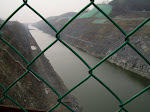http://english.hani.co.kr/arti/english_edition/e_national/386867.html
DLP Lawmaker Woo Wi-yeong calls it the worst civil engineering project ever, and DP lawmakers prepare legal actions to suspend construction
The Hankyoreh Posted on : Nov.10,2009 12:06 KST
Opposition parties’ lawmakers, who have been demanding the termination of the “Four Rivers Restoration Project” that the Lee administration announced will begin Tuesday, are calling the project a dictatorial scam and have launched a full-scale campaign to suspend construction, including filing for an injunction. Moreover, opponents to the Four Rivers Restoration Project have agreed on a plan to cut the entire 23 trillion Won budget for the project with the exception of the 1 trillion Won earmarked for water quality improvement.
Democratic Party (DP) Chairman Chung Sye-kyun slammed the Lee administration during a party supreme council meeting Monday, and said he was enraged that the administration’s dictatorial behavior was manifesting in pet projects such as this one. He added the administration has questioned why the public refers to it as a “dictatorship,” but the label is fitting when it decides to move forward unilaterally as it is doing now.
Chung said the administration had not conducted a proper feasibility study or a cultural properties study, and it conducted a slap-dash environmental impact assessment on the 634-kilometer area, completing it in just four months with unconvincing findings. He also said that the parliamentary screening of the budget put fourth by the administration has yet to begin, and that it is intorelable that the administration has commenced construction for the Four Rivers Restoration Project based on the assumption that the National Assembly will be passing the budget bill in its original form.
The DP is also actively considering filing an administrative suit or applying for a provisional disposition to suspend the project, which is suspected of being the “Grand Canal” project in disguise. During the party’s supreme council discussion on the Four Rivers Restoration Project, Lawmaker Park Ju-seon provided the argument that it violates the National Finance Law, the Rivers Law, the Basic Law on Environmental Policy and the Korea Water Resources Corporation Law.
The DP is also warning of a “budget struggle” in an attempt to cut the Four Rivers Restoration Project budget. An official connected to the party’s parliamentary leadership said the DP’s position is that it cannot allow the 23 trillion Won earmarked for the project, with the exception of the 1 trillion Won for flood damage and water quality improvement.
In a statement Monday, Woo Wi-yeong, spokesperson for the Democratic Labor Party, called the Four Rivers Restoration Project the worst civil engineering project since the time of Dangun, as well as the greatest scam. He said the arrogance and go-it-alone tendencies of the administration that is pushing forward with project construction, regards the project as an established fact, and believes it can hush up any further debate on the matter has come to a dangerous place.
Shark's fin Import increased in South Korea
13 years ago

